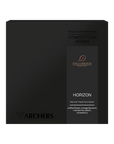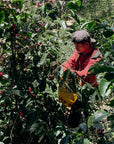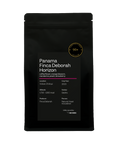Horizon underwent a hybrid process that started with harvesting perfectly ripe Panama Geisha cherries registering 21-24 on the BRIX meter. These cherries were twice sorted and selected before being deposited into hermetically sealed, stainless steel tanks, with a yeast inoculation strain added.
The cherries stayed immersed in this yeast bath for more than 100 hours, allowing the yeast to consume a substantial portion of the fruit within the cherries to generate high fruit notes and floral aromatics, that the coffee seeds then absorbed. In the cup, these would be expressed as enhanced aromatics, pleasantly elevated acidity, and a more palpable body.
Throughout this yeast-inoculated, extended fermentation phase, the cherries were constantly monitored and cataloged for both PH and temperature levels. The Finca Deborah team complied with strict parameters to ensure the process would only preserve and enhance the meticulously cultivated and harvested Panama Geisha's inherent sensory characteristics, and in no way let them acquire any unwanted notes or "off" flavors.
After the required time immersed in the yeast bath within the sealed tanks, the cherries were removed and transferred onto shaded, three-tiered raised African beds that Jamison himself designed. Temperatures and humidity were controlled inside the shaded drying areas, also referred to as dry houses, where these metrics were carefully maintained within specific parameters. The cherries were also consistently shifted throughout the day for even drying, to prevent undesired microbial activity from occurring, and to promote the development only of desired flavors.
The cherries spent around 12 days on the drying beds before reaching the proper moisture level of approximately 11%. To protect the quality that had painstakingly been created, they were then bagged in Grain-pro and stored under optimal conditions of cool and stable temperatures for a reposo or seasoning process critical in Jamison's stringent end-to-end QC protocol.
In reposo, the coffee's moisture content stabilized while allowing it to keep absorbing more flavor from its parchment or shell, before being hulled and further sorted by size, density, and color, and finally shipped to us.
About the Panama Geisha
Panama Geisha, of which Green Tip Geisha is one variation, is a rare, delicate, and complex variety well-loved for its sweet florality and citrus highlights. Since its debut win at the Best of Panama auction in 2004, it has kept specialty coffee lovers everywhere captivated by its endless possibilities, delicacy, complexity, and clarity of flavors. As such, it is often showcased on coffee competition stages by a great number of coffee champions, and it also continues to fetch the highest prices.
While a coffee’s truest intrinsic qualities are still largely believed to be showcased best by traditional washed processing due to the demucilaging, washing, and scrubbing steps removing all traces of fruit from the bean, the expertise of seasoned and passionate producers like Jamison Savage allows them to direct the flavor character of the Panama Geisha towards a seemingly endless diversity of delightfully surprising trajectories.
They do this through the purposeful implementation of traditional methods like the natural and honey processes, as well as intentional and innovative processing styles, such as this Natural - Yeast Inoculation process, which add to the complexity of the cup’s character — for example more layers of flavor or better mouthfeel — without compromising its inherent qualities from terroir and variety.










